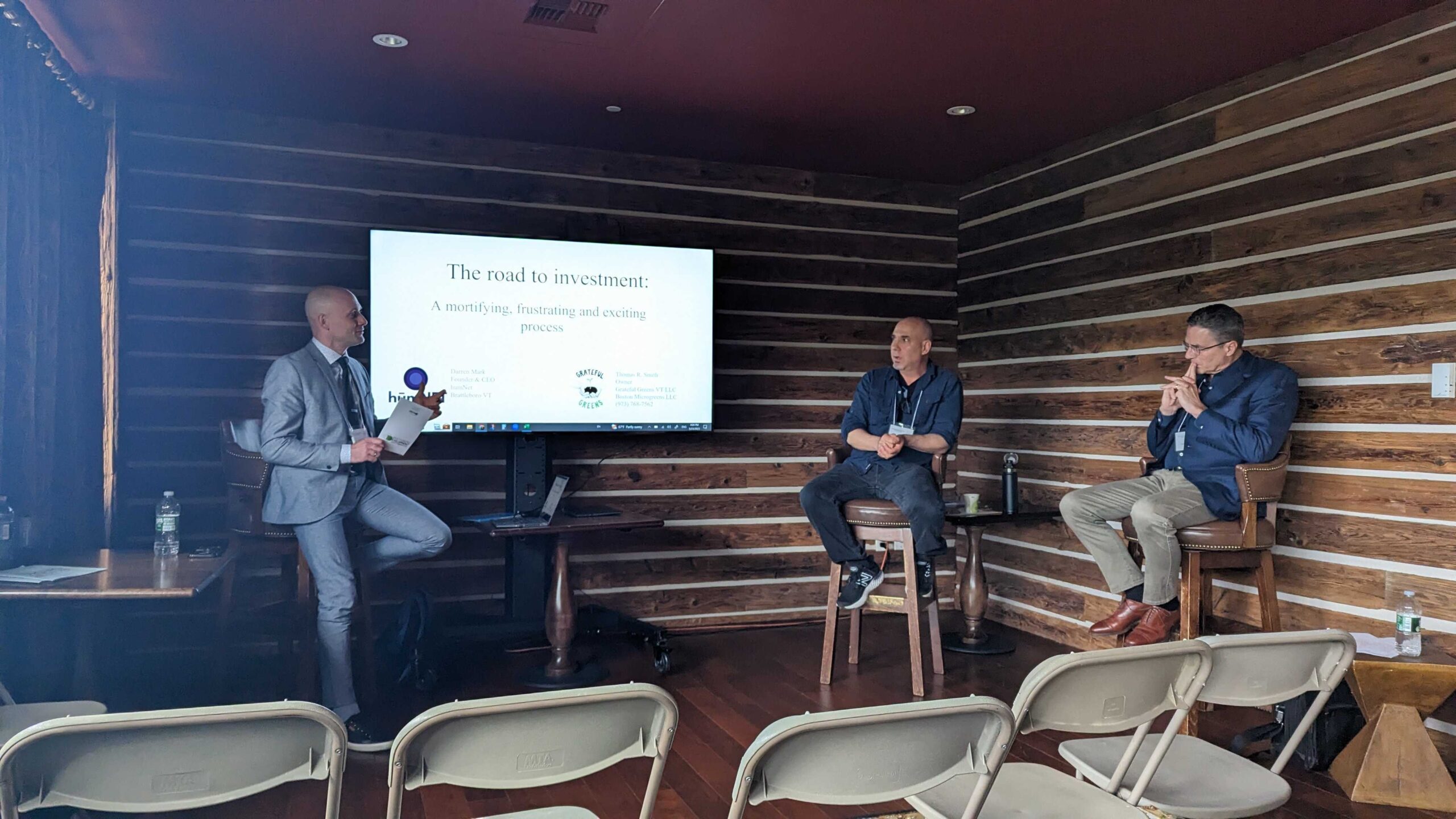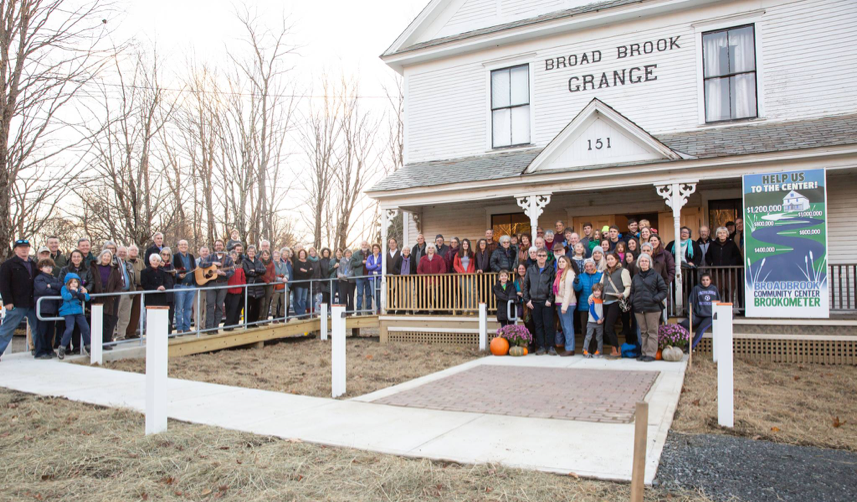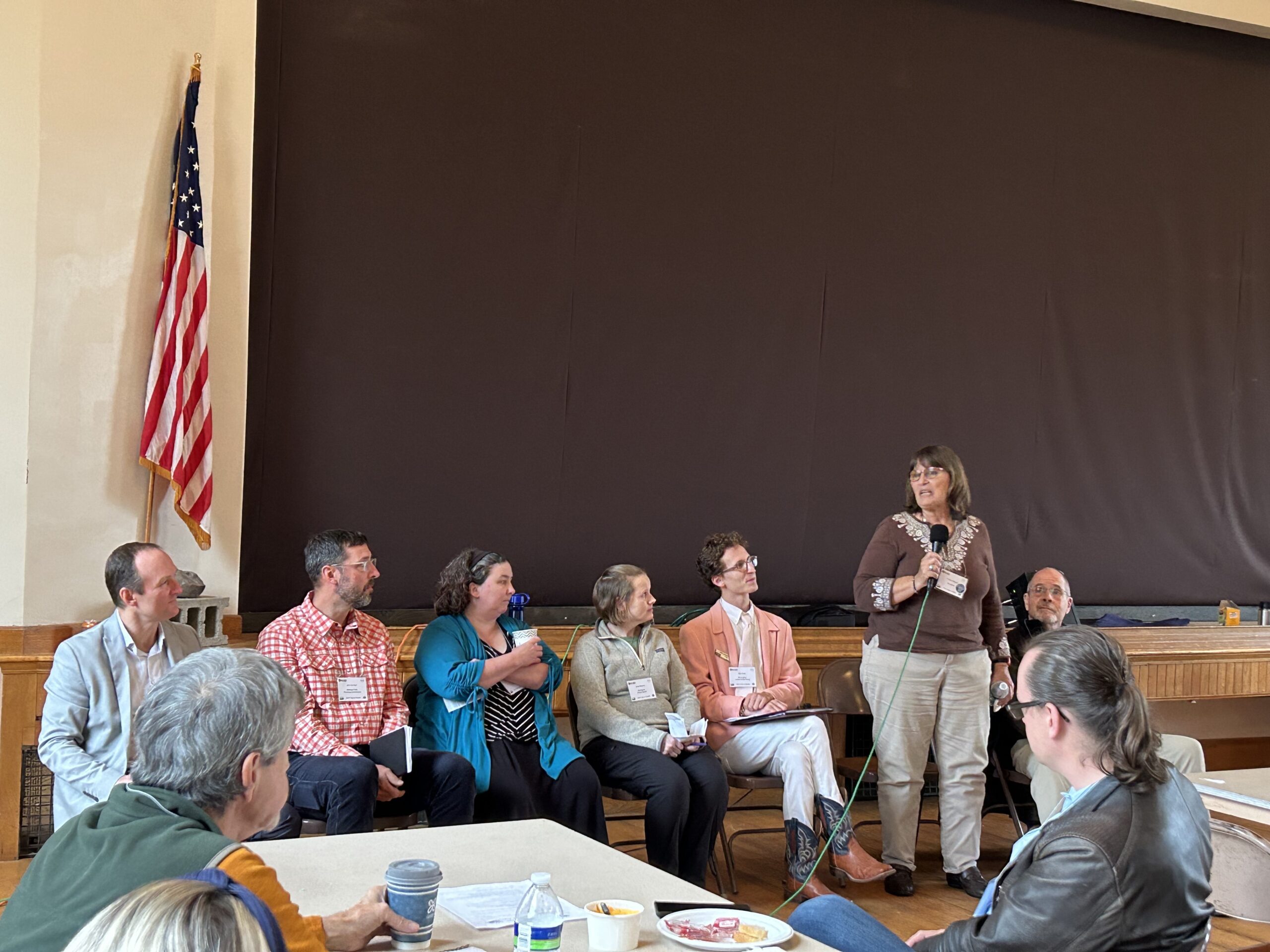
The Search for Capital in a Rural Region
At the 2023 Southern Vermont Economy Summit, attendees with an interest in getting a entrepreneur perspective on what it takes to source capital attended the session Seeking Business Investment: The Mortifying, Frustrating and Exciting Process
Local Businesses on the Hunt for investment Capital
Grateful Greens and hūmNET are two companies in Southeastern Vermont on the journey to answer that question. Tom Smith, owner of Grateful Greens, and Darren Mark, founder of humNet both spoke on a panel at the 2023 Southern Vermont Economy Summit titled The Road to Investment: The Mortifying, Frustrating and Exciting Process.
Grateful Greens – Not a factory farm, a farm located in an old factory
Grateful Greens farms, harvests, packages and delivers a wide variety of extremely nutritious and delicious microgreens. The company relocated its operations into a recently built-out, indoor vertical farm at the Cotton Mill in Brattleboro Vermont. To grow the reach of Grateful Greens, Tom orchestrated the acquisition of Boston Microgreens located in downtown Boston. This expansion of the business gives Grateful Greens customer accounts in Boston, and access to Boston and its high-end restaurants.
“It is our vision to scale the production of microgreens throughout the New England region and beyond”, says Tom. Grateful Greens’ strategy differentiates it from others by attacking microgreens biggest challenge; a short shelf-life. Tom and the team will accomplish this by 1) utilizing a hub and spoke approach with the addition of vertical container farms, and 2) freeze drying the greens for use in beauty products, and fruits for use in meal kits.
Grateful Greens needs additional capital to accomplish these aggressive goals. Tom has helped multiple businesses scale in the past, so he and his team are taking a systematic and intentional approach to finding the best capital partner(s).
hūmNET – That’s right, an app being launched in rural Vermont
hūmNET connects people through a mobile app focused on shared experiences. Darren emphasizes that while app development continues, customer discovery and early pilot testing have been priorities. He highlighted collaborations underway to utilize hūmNET for resilience and mental health among first responders and the recovery community.
Collaborations include a partnership with the Front Range Veterinary Medical Reserve Corps to develop protocols for regular “humns” – shared connections through the app – among volunteers encountering stress, trauma, and grief in their work. Locally, hūmNET is exploring how to address unmet needs for staff and clients at Turning Point of Windham County, which will serve those confronting substance use disorders.
Darren sees these collaborations as proving “traction and stickiness” for hūmNET’s vision before its public launch. He thanked attendees for their encouragement and enthusiasm for hūmNET’s mission of fostering shared connections that promote wellbeing.
hūmNET has received positive feedback and investor interest after its first pitch in the fall of 2022. Darren has been self-funding this endeavor to date. With the app still in development there are some hurdles to overcome before investors may begin to consider committing capital to hūmNET. However, the right connection with an investor could propel hūmNET along its growth trajectory.
Another difficulty for Darren and hūmNET is the lack of a tech base business culture in this region. He has kept costs down by subcontracting the UX/UI development. To cultivate an ecosystem around hūmNET, Darren applied for and was accepted into the Actuator startup incubator program at the Black River Innovation Campus (BRIC) in Springfield VT.
So, what does it take for an entrepreneur to obtain the type of capital financing not generally found in a rural region? Perseverance, foresight to know when resources are needed, thrift, and passion. Both Grateful Greens and hūmNET believe in the product they are selling; their next big hurdle is to help others believe in the same.
Across the United States, access to capital for local businesses has proven to be a cause of stagnation for rural economies. This issue is being addressed at multiple levels with financing options from federal down to local.
Existing Financing Options
The US Department of Treasury’s State Small Business Credit Initiative (SSBCI) supports state based investments into businesses. Another Treasury program, the Community Development Financial Institutions (CDFI) Fund, provides capital to qualified lenders to be lent to qualified businesses.
Local and regional Banks play an important role in rural economies. Banks provide business banking services to their customers and in doing so, a link to the community. A bank’s strictly regulated collateral, operating history, and credit reporting requirements can be nonstarters for small businesses.
Micro lenders, like the BDCC, can support businesses with small amounts of debt financing by leveraging the SBA and USDA RMAP capital opportunities. While operating history and credit score requirements can be more flexible, the tradeoff is a smaller borrowable amount, in the case of the BDCC up to $100,000.
Investment funds and private investors are another source of capital. Investors can be more flexible than traditional debt financing. On the flip side, those investments need to balance risk with reward. This can cause funds to target high growth investment opportunities. Entrepreneurial and existing businesses in rural areas generally do not meet their growth potential criteria.
Investor expectations of high return potential are difficult to meet for small businesses. This problem is compounded by a lack of investment firms based in rural areas. Without exposure to investment firm activities, rural business owners frequently lack the knowledge and understanding of investment capital potential.
Signaling a Lack of Capital
The most recent Comprehensive Economic Development Strategies (CEDS) of each of the adjoining counties all identify that access to capital for investment is a threat to that region (Bennington/Windham VT(SoVT, 2019), Southwest NH (SWRPC, 2020) and Franklin MA (FRCOG, 2020).
All three of these CEDS identified a need to develop and cultivate capital investment opportunities. So while money isn’t raining from the sky onto rural entrepreneurs, there is a general push in the direction creating access to capital.
About the Southern Vermont Economy Summit
The Southern Vermont Economy Summit is an initiative of the Brattleboro Development Credit Corporation’s Southern Vermont Economy Project. SVEP works to stabilize, improve, and expand the rural economic and workforce development network in Southern Vermont. Its goal is to increase capacity and collaboration among partnering organizations and communities. SVEP is funded by the USDA Rural Community Development Initiative, as a program of BDCC & SeVEDS. For more information on the summit, please visit www.SoVermontZone.com/summit.
About BDCC and SeVEDS
The Brattleboro Development Credit Corporation (BDCC) is a private, nonprofit economic development organization that serves as a catalyst for industrial and commercial growth throughout Southeastern Vermont, including Windham County and the towns of Readsboro, Searsburg, Winhall and Weston. BDCC serves as the State of Vermont’s certified Regional Development Corporation (RDC) for the greater Windham County area. BDCC is one of 12 RDCs throughout Vermont. This BDCC activity was made possible in part by a grant from the State of Vermont through the Agency of Commerce and Community Development. For more information visit https://brattleborodevelopment.com/.
Southeastern Vermont Economic Development Strategies (SeVEDS) is an affiliate of BDCC that grew from a 2008 grassroots effort, initiated by BDCC, to understand and create long term strategies needed to reverse the economic decline of the Windham Region and plan for the economic impacts from the closure of the Vermont Yankee nuclear power plant. In 2014, after multiple years of regional input, education, and data gathering, SeVEDS received federal approval for the Windham Region’s federally recognized S.M.A.R.T. Comprehensive Economic Development Strategy (CEDS). SeVEDS partnered with Bennington’s Regional Economic Development Group in 2018 to develop the 2019 Southern Vermont Zone CEDS. For more information visit www.seveds.com.



